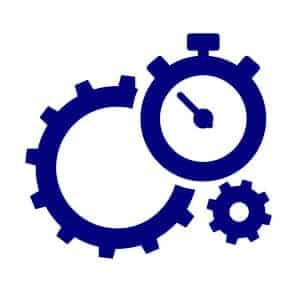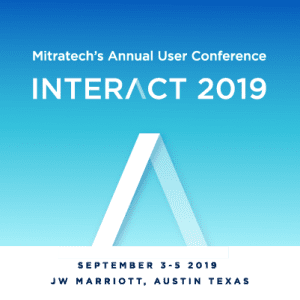Previewing Interact 2019: How Processes Support Legal Operations Success
What’s the second pillar of success in implementing Legal Operations? It’s about the Processes the go hand-in-hand with People and Technology.
Not so long ago, Mitratech’s Brian McGovern summed up the challenge ahead for corporate legal teams:
“In order to bring about more change within in-house legal departments, they need to break down the silos within their department and across the organization. This is where process improvement and the implementation of the right technology is of paramount importance.”
Empowering better processes for bottom-line results
Hobson & Company conducted a study that revealed the two primary challenges facing corporate legal departments: A lack of standardized processes was one of them; the other was inefficient systems for managing outside counsel. These two are closely linked, obviously. If you lack consistent, standardized processes, your management of external resources can’t be expected to be consistent or standardized, either.
Technology can help lift process to new levels of efficiency and performance. An Enterprise Legal Management solution, for example, can…
- …cut operational efficiency costs significantly by streamlining processes; the effort to open and assign new matters can be cut by as much as 75%.
- …by better managing outside counsel, external legal spend can be reduced by 5-10% annually.
- …by tying collaborators together through process automation, a company up to $3.1 million (or possibly more).
These standardized processes reduce or eradicate the risks of manual errors, and oversights such as overlooked emails or neglecting to include necessary data to a matter file.
Installing and supporting standardized processes used by everybody, and integrating those processes around a “single source of truth” in the form of centralized data assets like standard clauses and forms from a single, accessible-to-all location? That drives profound benefits for the legal department and the organization around it.
Focusing on smarter processes at Interact 2019
 As in our other three session tracks at this year’s conference, our Process track will feature in-depth explorations of how to improve Legal Ops processes. They’ll also include a great deal of actual Legal Ops community insight and user experience, as the Mitratech user community steps up and shares their own hard-won insights.
As in our other three session tracks at this year’s conference, our Process track will feature in-depth explorations of how to improve Legal Ops processes. They’ll also include a great deal of actual Legal Ops community insight and user experience, as the Mitratech user community steps up and shares their own hard-won insights.
These sessions are just some of the many you’ll find available by browsing the full agenda that’s been planned (with the help of our user community) for Interact 2019.
Like many of our sessions, this panel will be led by clients, and will explore exactly how enterprise businesses efficiently organize their legal teams. Attendees will be able to learn how even small and medium-sized firms can hire employees who bring along the optimal skillsets those companies will need to meet the growing needs and fluid challenges that lie ahead.
Drivers of Change: What’s Affecting the Way We Do Legal Ops
Unprecedented disruptions — including deregulation of the practice of law and technology advances — have changed the legal sector in the past ten years. Corporate legal departments are now feeling pressure to cut costs and operate more efficiently, even as the walls between “legal” and “the rest of the business” begin to tumble. In-house legal teams and the Legal Ops staff supporting them are now seen as commercial functions, and must drive economic value for the company. Attorneys are becoming business partners for company units, and Legal Ops processes are increasingly embedded in those departments, too. What’s this mean for Legal Ops and its evolution toward Legal Ops 2.0 – and beyond – over the next ten years? Hear the forecasts of a blue-chip panel of Legal Ops experts as they discuss what’s driving change today and tomorrow.
Lean 6-Sigma Process Training: Improving Performance & Creating a Culture of Change
Lean Six Sigma is a method that relies on a collaborative team effort to improve performance by systematically removing waste and reducing variation. It combines lean manufacturing/lean enterprise and Six Sigma to eliminate the eight kinds of waste: Defects, Overproduction, Waiting, Non-Utilized Talent, Transportation, Inventory, Motion, Extra-Processing. In this session, we’ll be covering the ways you can apply Lean Six Sigma methodology to improving the performance of existing processes, reducing process defects and waste, and creating a framework for overall organizational culture change.
7 Expert Legal Ops Predictions for 2020
Industry leaders give their predictions for changes they expect to see in the world of Legal Ops over the next year. What’s ahead for Legal Operations professionals and other legal tech users? The past few have already seen intense change, but our expert contributors have definite predictions on how transformation will stay the order of the day in 2020.
Leveraging TAP to Extend Your Legal Influence Throughout Your Corporation
Join our product experts as they present TeamConnect and TAP use cases revealing how users are already using TAP to extend the capabilities of TeamConnect beyond Legal Ops; now, other units and departments are able to implement efficient, compliant workflows with embedded legal best practices, making end-to-end ELM a reality across the enterprise.
As recommended in our People track post, if you’re not registered for Interact 2019 yet? Do it today and you won’t miss out on another vital and valuable conference, bolstered by the presence and free-flowing participation of the best user community imaginable.





